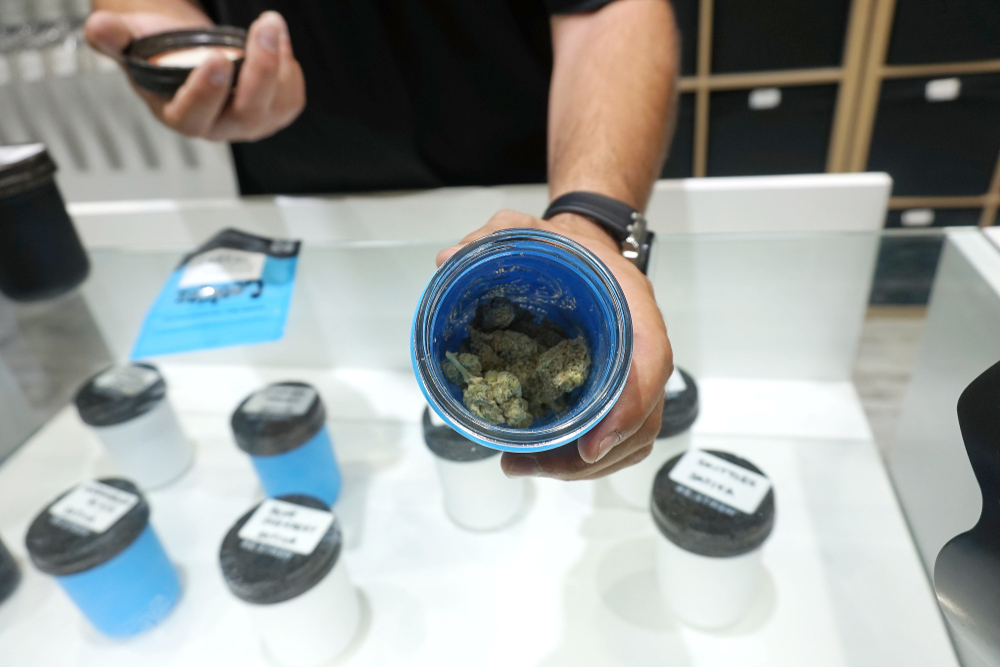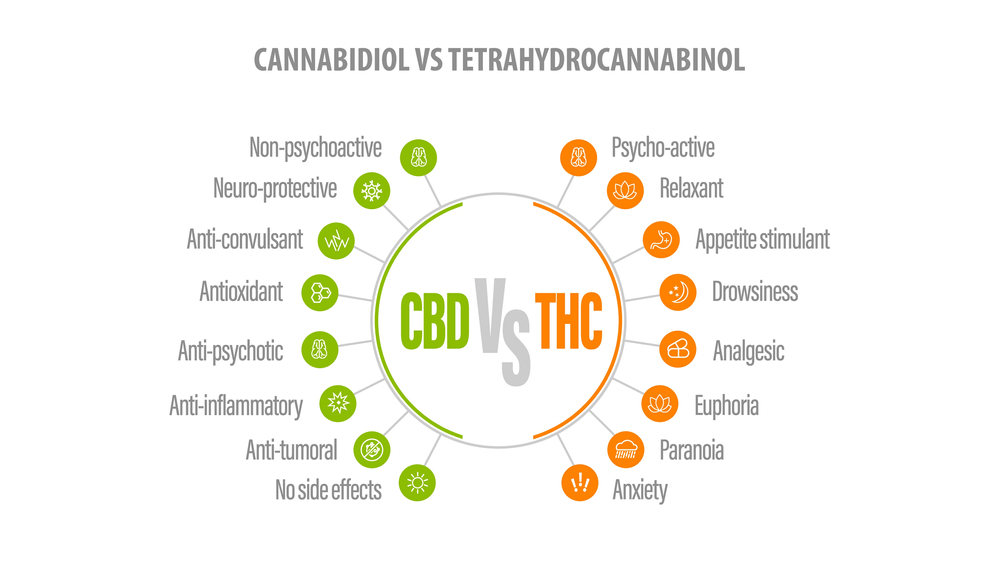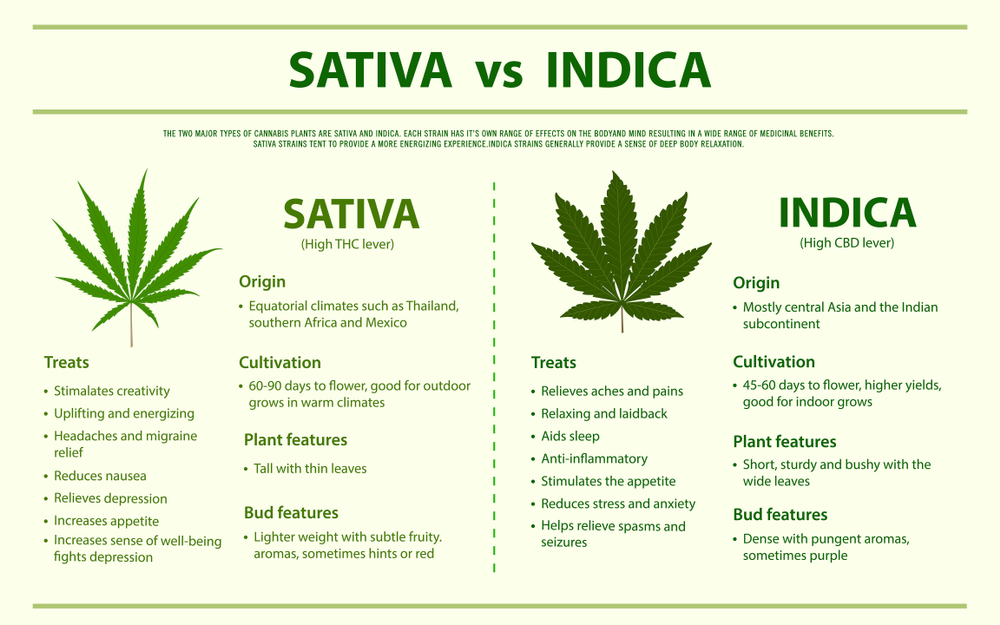Picture this: you’re lying in bed, tossing and turning, counting imaginary sheep — but sleep seems to be playing hide-and-seek. We’ve all been there. But here’s the good news — cannabis might help. So why not explore the potential of cannabis as a sleep aid?
Grab your comfiest pajamas, a cup of chamomile tea (or maybe something a bit greener) and join us in discovering how certain strains may improve sleep and rest.
Behind the Buzz: Breaking Down the Basics of Weed
Cannabis contains a wealth of fascinating components that influence our bodies and minds. At the core of the effects of cannabis are cannabinoids and terpenes. These compounds interact with our endocannabinoid system (ECS), a comprehensive network of endocannabinoids made by your body, receptors and enzymes spread throughout your body.
What Are Cannabinoids?
Cannabinoids are chemical compounds found naturally in the cannabis plant. These compounds interact with the body’s endocannabinoid system. The two most well-known cannabinoids are tetrahydrocannabinol (THC) and cannabidiol (CBD). THC is responsible for the intoxicating effects associated with cannabis use, while you may seek out CBD to explore the therapeutic benefits without the “high.” Over 100 cannabinoids have been discovered, each with unique effects and potential health benefits.
What Are Terpenes?
Terpenes are aromatic compounds found in plants of all kinds, including cannabis. Terpenes are responsible for the distinctive scent, flavor and some effects we associate with certain cannabis strains. When combined with cannabinoids, terpenes can enhance or modify the entire cannabis experience, creating what is commonly referred to as the “entourage effect.” Myrcene, for example, is known for its calming and sedative properties, while limonene is believed to have mood-lifting and stress-relieving effects.
What Is The Endocannabinoid System?
The endocannabinoid system is a complex biological system in all mammals, including humans. The ECS operates primarily through the interaction of cannabinoids (both endocannabinoids made by your body and phytocannabinoids like THC and CBD) and cannabinoid receptors. These receptors are clustered in your central nervous system, immune system, peripheral nervous system, organs and many more places from head to toe.
The ECS plays a crucial role in regulating bodily functions, influencing various functions such as mood, pain perception, appetite, immune response and sleep patterns. The ECS is also responsible for maintaining balance and harmony within the body, called homeostasis.
The Science of Sleep: Understanding Your Circadian Rhythm
Sleep is vital — it’s how our bodies and minds rest and rejuvenate each day. During sleep, hormones are released to promote tissue growth and repair, strengthen the immune system, consolidate memories and process information. Sleep also plays a crucial role in regulating mood and emotions and contributing to our emotional well-being. Poor sleep affects our mood, ability to concentrate, cognitive function and overall health, among other adverse effects.
The sleep cycle is generally influenced by the body’s internal clock, also known as our circadian rhythm. This natural rhythm helps various physiological and behavioral processes sync up with the 24-hour day-night cycle and is crucial in promoting regular and healthy deep sleep patterns.
Sleep isn’t just about tucking yourself in and pulling up the covers. There are sleep cycles you go through each night that all contribute to a good night’s rest, called sleep architecture. Non-rapid eye movement (NREM) sleep encompasses both light sleep and deep sleep, where we’re relaxing and dozing. Slow-wave sleep is part of NREM sleep. Rapid eye movements characterize rapid eye movement (REM) sleep, heightened brain activity and vivid dreaming.
Sleep quality is essential, and there are various factors, including lifestyle choices and even cannabis, that can influence how well we rest at night.
Cannabis and Sleep: The Strain Game
Different strains of cannabis produce different effects, most of which are determined by the strain’s specific combination of cannabinoids and terpenes. You may have heard of the cannabis indica debate, whether indicas are best for sleep benefits. However, that’s not precisely the case. The indica, sativa and hybrid distinction is not what primarily drives your cannabis experience — it’s more important to see which cannabinoids and terpenes are in the product you want to try for sleep.
Anecdotal evidence indicates that certain cannabis strains may help you fall asleep and stay asleep by reducing symptoms related to anxiety, post-traumatic stress disorder (PTSD) and chronic pain. To that end, it’s important to shop for cannabis products that address the root cause of sleeplessness, whether there are worries on your mind or you need some pain relief. Some strains that may be worth looking into include:
Granddaddy Purple
Known for its relaxing and sedative properties, Granddaddy Purple is a popular strain with a distinct grape-like smell. Granddaddy Purple has a higher THC content and contains the relaxing terpenes myrcene and pinene, making it a favorite among those seeking a tranquil end-of-day experience. Myrcene and pinene are also associated with relieving the symptoms of chronic pain.
A few of Hello Cannabis’s favorite GD Purp products include:
- Baby Jeeter Infused Pre-rolls
- Granddaddy Purp – LIIIL STIIIZY
- Sauce Essentials 1G Live Resin Infused Disposable vape
Wedding Cake
This strain is a potent indica-dominant hybrid cultivated by crossing Animal Mints with Triangle Kush. You can recognize Wedding Cake for its vanilla flavor profile and relaxing, euphoric effects. Its dominant terpene is beta-caryophyllene, which may have anxiolytic (anti-anxiety) properties.
A few faves include:
- Big Chief THC Cartridge 1G
- Gelato Wedding Cake Kief
- Claybourne Co. Wedding Cake Flower
Hindu Kush
This classic indica cannabis strain is widely reviewed for its sleep-inducing properties. With beta-caryophyllene, limonene and myrcene as the abundant terpenes, Hindu Kush has an earthy and pungent aroma with subtle hints of sweet sandalwood.
Our product picks are:
Dosing 101: Finding Your Sweet Spot
The right dose for you is unique to your needs. Here are some practical tips to help you determine your ideal weed dosage for a restful night’s sleep:
Start with low THC and CBD levels
A 2008 study found that higher doses of THC may reduce the amount of REM sleep you get each night. That means you should consider smaller amounts of cannabis for sleep. This approach allows you to assess how your body responds without inadvertently overpowering your system. Look for strains with balanced THC-to-CBD ratios or CBD-dominant products, as they will likely induce fewer adverse effects.
Look for Products with CBN
CBN, or cannabinol, is a compound found in aged cannabis plants. This cannabinoid has sedative effects that can help you relax and get to sleep faster. When combined with other cannabinoids like THC and CBD, it can create a synergistic effect that can make your sleep better than ever. Look for products with higher levels of CBN for optimal sleep-supportive effects.
Additionally, certain terpenes have been linked to sleep-inducing effects. These include myrcene and limonene, so look for products with higher concentrations of these two compounds.
Increase Dosage Gradually
Always follow the mantra “start low, go slow” when trying new cannabis products for any reason, sleep included. Begin with a small dose and gradually increase it over time as needed. This lets you discover the minimum amount required to achieve the sleep-inducing effects you want without any downsides that may come with too much THC, such as exacerbated anxiety.
Keep a Sleep Journal
Record how much cannabis you take, in what form, and when you take it. Make notes about your sleep quality and how you felt before and after taking that cannabis product. Tracking your experiences and patterns in a journal can help you to make more informed adjustments and fine-tune your dosage.
Explore Different Ingestion Methods
Cannabis is available in many forms, from inhalation with flower, concentrates or vapes to edibles, tinctures and transdermal patches. Each offers its own onset time and duration of effects. The product you choose directly relates to when and how you experience sleep issues.
If you’re having trouble falling asleep (also known as sleep latency), inhalation methods that work faster in your body may be best. If you want to stay asleep, edibles or tinctures that provide longer-lasting effects through slower absorption may be better. Experiment with other products to find the best method for your sleep routine and needs.
Mindful Consumption for Sustainable Sleep Health
While cannabis shows promise as a sleep aid, it should be a tool in your toolbox and not something you rely on every night to sleep. Practicing mindful cannabis consumption and incorporating it into a balanced sleep routine may yield more consistent results. Here’s how you can make cannabis a mindful part of your sleep routine:
- Create a consistent sleep schedule: Establishing a regular sleep schedule can work wonders for you. Aim to go to bed and wake up at the same time each day, even on your days off.
- Design a relaxing bedtime ritual: You may want to try combining your nightly cannabis consumption with a calming bedtime ritual to amplify its soothing effects. Try pairing your preferred product with relaxation techniques such as deep breathing or gentle stretching — a technique that both has relaxing effects and is great for issues like chronic pain — to prepare your body and mind for deep sleep.
- Limit screen time before bed: As you wind down each night, try replacing screen time with your cannabis consumption ritual. Ditching your electronic device and opting for a moment of mindful consumption will promote a more tranquil state of mind before bedtime.
- Create a comfortable sleep environment: Ensure your bedroom is cozy, dark and free from distraction so you can settle in for a restorative sleep.
- Practice mindful meditation: A great way to incorporate cannabis into your sleep routine is through mindfulness meditation. Focus on the sensations and effects you feel from the cannabis as you drift off to sleep. Let this relaxing ritual become a part of your sleep routine.
Crafting Your Zzz-Friendly Weed Routine with Hello Cannabis
Whether you want to reduce anxiety or you’re in search of pain relief, using cannabis may help address certain sleep problems. Keep in mind, however, that not all sleep disorders are helped by cannabis. If you have a sleep disorder such as sleep apnea or narcolepsy, cannabis is not an effective sleep aid. If your difficulty sleeping stems from an issue that can be helped by cannabis, like anxiety or chronic pain, cannabis use may be a worthy sleep aid to try.
While the path to better sleep through cannabis is unique for each individual, the team at Hello Cannabis is here to help you with helpful tips, education and product recommendations. Ready to take a step toward a more restful and rejuvenating sleep? Browse our menu online or visit our store to start your journey today!




